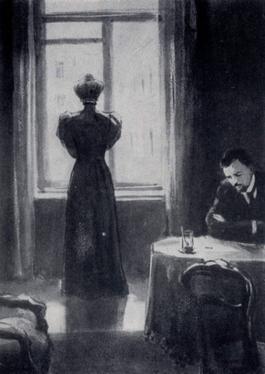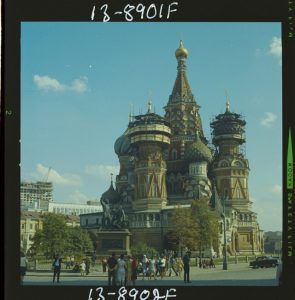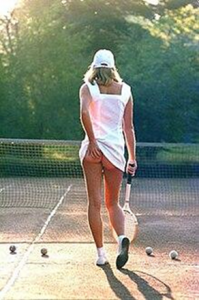by Emil Draitser
(Translated from the Russian by the author)
“How? How?” He [Gurov] asked, clutching his head. “How?”
And it seemed that a bit more – and the solution will be found, and then a new, wonderful life will begin; and it was clear to both of them that the end is still far, far away and that the most complex and difficult is just beginning.
— Anton Chekhov, “The Lady with the Lapdog”
Gurov and Anna Sergeevna were able, in the end, to make a life together. This came not without great sacrifice and loss, but their love was as natural as the sea, and they endured all adversity. Gurov’s divorce had been painful, with scenes straight out of Dostoevsky, complete with the smashing of cheap crockery and his wife’s emerging contralto:
“Dimitry, such childish behavior doesn’t become you! What’s all this about love? Just who is this lady with a lapdog? You’ve read too many wicked, trashy writers. You’re having a mid-life crisis—just like a lot of other men. Look at you—here you’re turning gray at the temples, and you’re running after some lapdog. What am I saying! I mean, some woman and her mutt. Oh, what difference does it make! Besides, what kind of lady would steal a husband away from his still-living wife? Couldn’t you wait until I died? After all, it won’t be long now!”
She held up a vial of tincture of valerian to the light and counted off the drops aloud, sometimes swallowing the beginning of the numbers:
“.. ‘teen, … ‘teen,… twenty! So, tell me, what does she know how to do..”–On his wife’s face a base little sneer would arise–“that’s so beyond my understanding, too much for my intellect?”
Horror gripped Gurov. He had been married, for so long, to this unfeeling, crude woman. These exchanges nauseated him. He became convinced of a psychosomatic connection between human speech and the physiological reaction to it. He feared choking on the vulgar, tiresome, and inept melodrama played out by his wife, in which she had foisted upon him the role of the villain. Whenever she spoke about Anna Sergeevna, he wanted to scream, “Don’t you dare talk about her!” — but he couldn’t. Nausea and loathing smothered him. He grabbed his hat, and despite the rain and the wind, darted out of the house. He walked the city, talking aloud to himself. Passers-by took him for either a drunkard or an actor, obsessed with an upcoming premiere, rehearsing a monologue in the street.
It occurred to Gurov that whenever happiness doesn’t come on time, it takes revenge. All the vulgarity and pettiness of life stick to it, as butcher’s paper to the raw meat in the Moscow markets.
Remarkably soon after the divorce, his ex-wife recovered from the blow and married the bushy-mustached owner of a saddler’s shop on Neglinny Street — a man who, for all appearances, had never picked up a book in his life, except a ledger. She informed mutual friends, knowing well that it would reach Gurov, that she was grateful to be free of a husband who had all the masculinity of a moth. She rolled up her eyes and declared that her new husband Korennoy made her feel like a woman, for the very “first” time.
Gurov loved Anna Sergeevna as much as before. But gradually, to his shame, he became irritated by what at first had been so appealing about her — her youth, her inexperience at love, her naivete, that nearly infantile quality of hers. He now saw that she was almost half his age, still a young being, full of those lofty ideals which he too had held when embarking on adult life. His “Donna Quixote” could not accept things as they were.
Her endless complaining about boredom annoyed Gurov most of all. “How dull it is on this earth, gentlemen…” Only a young person could say such a thing, someone familiar with life’s outer layer, its epidermis. Life could not be fascinating. To make such demands upon it was unreasonable. You couldn’t expect some lake to turn itself into the fountains of Versailles. In order not to be boring, life had to be structured according to the laws of drama: with an intriguing opening, an intensifying conflict, and a liberating catharsis. (In these musings Gurov’s philological training served him well: Aristotle would have been satisfied with him, while Chernov, his former gymnasium teacher of logic, would be delighted.)
But was it possible to devise a life story so exciting you just couldn’t tear yourself away?
The truth is, Gurov reasoned, that you cannot provide all people with original life stories. True boredom comes only from idleness. To his surprise, his work at the bank, which he always viewed as a necessary evil and saw no point in endless calculations and filling out papers with his beautiful handwriting, drew more and more of his interest. Through the rows of faceless figures, it penetrated his consciousness that, in the end, the finances were the blood of the country, and, therefore, the health of his motherland depended on how well this blood was being pumped, and so, he, Gurov, was involved in something important and worthwhile.
Gurov also began realizing how akin to Anna Sergeevna’s his earlier attitude had been. Why complain about the senselessness of life? Life is life; it’s neither good nor bad. It’s just a patchwork of events of uneven importance, hastily stitched together and often torn along the causal and temporal lines. Being angry at life — at its absurdity, at the absence of any logic to it, and its stubborn unwillingness to fit into any rational model — was as foolish, as getting upset by there being sun one moment and pouring rain or gusty wind the next. You had to be stupid or conceited to think that life attended to you, with the sole purpose of annoying or pleasing just you.
Gurov felt some disappointment that his intimate relations with Anna Sergeevna had, with time, become monotonous. He had not lost his ardor. But Anna Sergeevna could read poetry avidly, listen to Tchaikovsky and Glinka for hours, and expound upon the loftiest subjects. In short, she appreciated the pleasures of the spirit — and still, she was ashamed of her passion and that enormous joy it brought her. She regarded the needs of the body as an unavoidable evil, something generated by a human being’s animal nature. Had it been up to her, she would have constructed man differently: a lot of heart, a lot of the head, and only the minimum of the body required to keep them going. That the result could be, at best, a noble homunculus, did not concern her. In the end, it was only daydreaming, and you ought to treat it as carefully, like a newborn kitten…
Nevertheless, Gurov continued to love Anna Sergeevna, and could not imagine life without her. He already saw how, year by year, he was going to grow old together with her. If he felt some tedium with her, she also gave him comfort.
On weekends Gurov visited with his children, in turn — one Sunday with his sons, the next with his daughter. These visits occupied the entire day, his only day off, and drained him. His sons were already nearly adults; in no time they would be finishing their gymnasium, within a year of each other. Kostya had half a year to go, and his younger brother Dmitry a year and a half. As might be expected at their age, they took their father’s leaving badly. At their meetings, they behaved with pointed courtesy, invariably addressing him by the formal “you.” They were even somewhat arrogant, at times sarcastic (squinting his eyes and flaring his nostrils with fury, Kostya one day said, “By the way, how’s the Spitz?”). It was obvious they suffered.
His daughter too behaved coldly. She sometimes frowned and asked him, out of place, when he was coming home. Her still childish mind couldn’t reconcile the image of how things used to be—father, mother, family breakfasts in the dining room, guests at dinner—with today’s reality. Father lived somewhere on the other side of the city with a stranger, someone else’s former wife, even though he had his wife (and that woman, her husband!); while at the same time a huge, unfamiliar man, who smelled of turpentine and the coarse leather used to make harnesses for horses, slept in mama’s bedroom. This simply couldn’t go on forever! She used to be an intelligent and serious girl — just like her mother. Now she even fell behind in mathematics, in which she had always earned top marks.
Gurov knew he could not have acted otherwise than by ending his marriage. He tried to console himself with the thought that a happy father could give much greater emotional strength to his children than one as unhappy as he had been before he had met Anna Sergeevna. Yet he was aware that to his children, he would always be the person who had abandoned them. He had sinned—very well, against his will, for he had been married off. Nevertheless, this sin—marrying a woman he didn’t love — was so egregious that he would carry this cross, this sense of guilt toward his children, to the end of his life.
Meanwhile, as he returned home to dinner from work, he more and more often found Anna Sergeevna saddened. She frequently and for no apparent reason cried, and in answer to Gurov’s questions said that she didn’t know what was wrong. One day she announced she was traveling to S., the town she used to live during her marriage. She wanted to visit with the wife of the State Councilor Nezvanov, her only female friend, whom she missed a great deal.
When Anna Sergeevna had been gone two weeks, Gurov worried and sent a letter to her friend’s address. Soon an envelope arrived from S. Anna Sergeevna wrote that, by chance, while walking her Pomeranian, she met her former husband, von Diederitz. He had declined severely. For the first time, she felt pangs of conscience for wrecking the life of this man who had done her no wrong. His servility, which had so embarrassed her, had after all resulted from a hard, fatherless childhood spent in an orphanage. And she had to give him credit for becoming a prominent official, instead of going wrong. He deserved, if not love, then at least some respect.
At the sight of her, Diederitz had first turned pale and then begun to weep—shamelessly and without even drying his face. All the matches in the town of S. had dampened, and that evening not a single candle or gas lamp could be lighted. Thus, with this total blackout, as though mourning, the town of S. had marked the return of Anna Sergeevna.
She further wrote that she was going back to Diederitz. She couldn’t leave him utterly alone. She couldn’t leave it as it is; her conscience would never be at peace. She knew that he, Gurov, with his kind heart, would agree with her you cannot build your happiness on the misfortune of another, innocent man. It’s unfair and inhumane, no matter from which vantage point to look at it. Though she loved only him, Gurov, she would stay with Diederitz until she found those necessary, kind words that would console him and soothe his emotional anguish. There was no one else to do it for him. He was all alone on this earth, since his only brother, who had also been orphaned, was far away, serving as a staff officer on the Turkish border.
Gurov went to S. He stayed in the same hotel and in the same room he had taken on his last trip. The inkwell on the table also remained from before. But he at once noted that what had earlier looked like a decapitated horseman holding a hat was a centaur carrying a bow and thrusting his arm upwards, celebrating the hitting of his target. It wasn’t bad for an everyday thing. The owner of the hotel had likewise acted sensibly in covering the floor with a heavy cloth. Thanks to this, the heels of the ladies’ shoes and the boots of the gentleman officers who stayed there were inaudible, and the hotel was quiet. To further maintain the restful hush, the servants spoke in undertones.
Gurov headed for Diederitz’s house, familiar to him from his last visit. It was fall. The blazing, bloody yolk of the sun was falling below the horizon. The gray fence in front of Anna Sergeevna’s bedroom window, studded with nails, appeared painted the color of fully ripened apricots. The nails cast sharp shadows that, crisscrossing, seemed to form Japanese characters. He didn’t know Japanese, but for some reason thought the inscription was something taunting: Keep your chin up, Gurov!
Gurov grew sad and decided that his last hope was to meet Anna Sergeevna at the theater, at a benefit performance by the same tenor who had sung on that memorable evening of his previous visit when he desperately wanted to see her after their first separation, shortly after they met in Yalta. In the theater, Anna Sergeevna was startled to see him but seemed not too surprised.
She led him to the entrance to the amphitheater, to about the same spot where they had talked last time. She said that she understood his feelings, but wanted to assure him that only her sense of guilt before her former husband kept her in S. She begged Gurov not to be angry with her, to try to understand. Once again she assured him she still loved only him, Gurov, and he shouldn’t worry. She would return to him without fail. She couldn’t specify when it would happen. She only knew that time was the great healer, and, God willing, all would turn well in the end.
“My dear, good Gurov!” she said, pressing his hand to her chest. “I know you have a great, kind heart. You’ll see that I can’t act otherwise.”
Gurov parted with her. He wondered whether his heart was of sufficient size to return Anna Sergeevna to Diederitz, even if only for a time. Anna Sergeevna would pick up cats in the street with bruised paws and sparrows with broken wings… and here was Diederitz, the little mouse, whom she also pitied. That was Anna Sergeevna.
Gurov left for Moscow and tried to live without reflecting upon anything — neither upon what would become of Anna Sergeevna and him, nor upon the children, nor his life in any distant future. He tried to think only of his work, no further than the day ahead.
At first, it helped. But soon he reminded himself of a blind man who walks tapping his cane along fences, tree trunks, and the sidewalk, to the right and left. Before crossing the street, this blind man would knock his cane against the feet of lampposts and the granite curbs. Afraid of stumbling or tripping, he would bounce his light cane in his hands again and again. Gurov noticed that he, too, had begun to walk cautiously.
Gurov took an extra holiday and as usual went to the south, to Yalta, where before going to meet Anna Sergeevna, he would go when his spirits were downhearted. He walked along the harbor and all day long watched the unloading of the steamships. There was something unusually satisfying, almost sensual, in observing a huge liner’s interior being freed up, little by little. One day, a cow began to float upwards from a liner’s maw. She was girded by burlap below the belly, her legs spread out awkwardly in the air. Rust-colored, she had a large, pink spot, like a slight shadow, on her muzzle. This spot even made her pretty. She timidly looked all around and saw Gurov after slowly lowering her head obliquely. She moved her lips.
So what’s with the open mouth, Gurov? You’ve never seen a cow in the sky? You think such a thing can’t happen to you?”
Maybe the cow was right. In just the same way, Gurov’s fortune had risen slightly above the earth. No one knew where it would descend, and how carefully. The longshoremen, who were pulling out cable intestines from somewhere beneath the cow’s belly, knew their trade. But some of them would every so often become exhausted from the heat, and too much vodka on an empty stomach. A load would come crashing down onto the ground, dunged with fuel oil, of the pier.
Gurov turned on his heels and began to walk away. He found, from memory, the hotel where he had been seeing Anna Sergeevna. He was hardly surprised to discover her at the hotel’s hall. They came up to the room, and she explained that, apparently, because of her being upset all the time, her health began failing; her old internal discomfort resumed, and, on the advice of doctors, she went to the sea, to the mud baths.
Gurov’s heart grew heavy. To suppress the bad feeling, he walked over to the table on which a watermelon rested in crushed ice, and began to cut it. Anna Sergeevna began crying quietly, dabbing her eyes with a handkerchief and saying, barely audibly, “Oh, Gurov, what’s going to happen to all of us!”
“Let her have her cry out,” he said to himself. “I’ll sit down and wait,” he thought, and he sat down in an armchair. He turned to the table, and without haste, slice by slice, began eating the watermelon.
Gradually Anna Sergeevna calmed down. Her tears ceased to flow, and her eyes had become so dry that she had to drop the medicine into them to avoid conjunctivitis.
She and Gurov made love and then went for a stroll along the quay. They set off, however, on separate paths. Anna Sergeevna walked alone with her lapdog. Gurov, carrying his walking stick, observed the ladies passing by and found to his surprise that among them were many as young and pretty as before. He thought about love, and how it was, perhaps, a burdensome thing, from which providence had for most of his life protected him. He encountered an elegantly dressed gentleman with a cane and pince-nez, whose face was withered from pulmonary disease. Gurov had no idea who he was, but for some reason, he wanted to pat him on the shoulder and say, “It’s all right, all right, my friend, more odd things than that happen in this world…”
His chest filled with the warm air saturated with sea spray, Gurov felt he was just beginning again to love life. He decided to avoid, for a time, any new liaisons. He stretched and said, almost loudly, “Eh! All the same, I’m alive, and that, in itself, is unbelievable happiness.” From the plenitude of his feelings, he even felt like jumping up but was too shy: there were many people on the quay. White, blue, and pink lace umbrellas hid the ladies’ faces, but he knew it wouldn’t be worth stealing a glance. If happiness should want to choose him, it would give him a sign by lifting one of the umbrella’s edges…
Besides twelve books of artistic and scholarly prose, the most recent ones being In the Jaws of the Crocodile: A Soviet Memoir and Farewell, Mama Odessa: A Novel and earlier ones include Techniques of Satire: The Case of Saltykov-Shchedrin. The author’s work has also appeared in the Partisan Review, Kenyon Review, North American Review, World Literature Today, Prizm International, and elsewhere. Emil Draitser is a three-time recipient of the New Jersey Council on the Arts fellowships in writing, as well as numerous grants for fiction and nonfiction from the City University of New York. Currently, he teaches Russian at Hunter College in NYC.






Be First to Comment